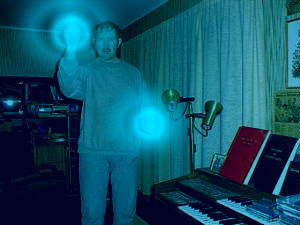Monday 19 April 1999


Pic of the day: Are we having fun yet?
I have to admit I liked this sooo much better than eye beams.
This is, like, me. My color and all. Next time I'll just have
to work on the costume.
Spent the morning in a rather sour mood, by my standards. (Not singing, for instance.) My clock radio woke me up with the song "Fysste morningen" (yes, that means the first morning, and is Rogaland dialect). It's a beautiful song, actually quite romantic, and the girl can sing. But somehow it reminded me of a pervasive problem of our society, in my rambling opinion. Namely, the idea that sexuality (in a somewhat wider meaning than just coitus) can sort of fill the roles of both sexuality and religion. That it is not just fun, it is also supposed to provide the meaning of life.[1] This, methinks, will only work as long as you're a teenager and perhaps a couple more years.
For what it's worth, I am similarly sceptical to letting religion try to take up the slack for lack of a decent sex life. With all due respect for monks and nuns and catholic priests, I think they are dead wrong and bordering on the perverse. (And don't get me started on that "bridegroom of the soul" thing. ) For various reasons, some people cannot have a healthy, funny and fullfilling sex life. That's just too bad, but not all people can sing either, and some are even blind. None of these conditions makes a person any more or less holy. How obvious must a thing be to be obvious?
My mood wasn't much improved by reading on the bus about depression.
According to this theory in Psychology Today, depression
isn't as simple as a lack of some single nevrotransmitter.
And the reason why Prozak, Zoloft and the gang work, such as they
usually do, may be side-effects. The good news is that
it may now be possible to target treatment better.
It seems that there is a more or less regular stream of signals from
amygdala, the brain's "fear factory", even in normal people. But
usually it is kept in check by the left prefrontal cortex, one of the
main arbiters of higher mental functions. When this check fails,
as it were, despair runs wild all over the brain, and various subsystems
buckle under the stress.
The article does not mention this, but I've read elsewhere that amygdala is a part of the brain that gets a good trashing during the second mass extinction of brain cells that take place around the age of 40 or so. (The first and by far most extreme mass death of brain connections takes place during puberty.) This makes sense, in a way. If people have kept alive that far, there may be reason to turn down the worry knob. You wouldn't want a grown-up to be too worried about his own skin to sacrifice himself for the next generation, after all. If need be.
So the midlife crisis is perhaps after all biological rather than psychological. But the reason why it's often a crisis rather than an improvement, may hinge on a culture that does not accept that we change as we age. A culture that demands childhood to last till we're 25 and youth till we're 70.
Methinks a child should seek knowledge, a youth should seek insight, and us grown-ups should seek wisdom. Each builds on the level below. We start close up, just seeing random details of the world. But as we walk on, the trees fade and we start to see the forest.
Reading about depression isn't the most uplifting thing to do, even when you're not depressed yourself. And I hardly think I am. That's sort of funny, because statistically I should be smack in the middle of the swamp. Good thing I'm not. I hear depression is really, really bad. For oneself and others.